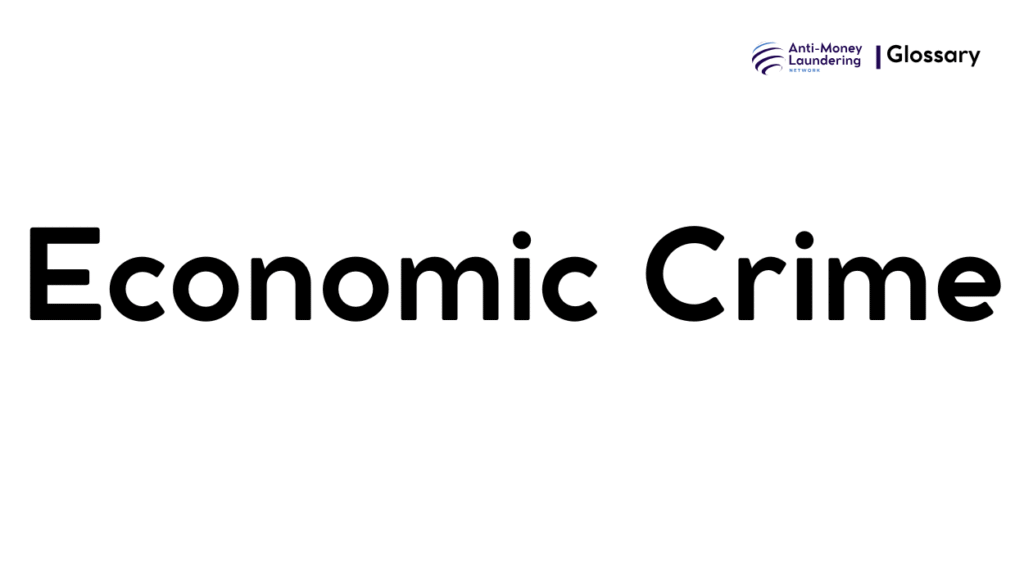Definition
Economic crime, in the context of Anti-Money Laundering (AML), refers to a broad category of criminal activities involving money, finance, or assets with the purpose of unlawfully obtaining a profit or advantage for the perpetrator or causing loss to others. Such crimes pose significant threats to national security, economic stability, the integrity of financial systems, and legitimate businesses. Economic crime encompasses acts that enable criminals to benefit from the proceeds of illegal activity or fund further criminality, thereby undermining trust in financial institutions and markets.
Purpose and Regulatory Basis
The role of addressing economic crime within AML efforts is critical. AML laws and regulations are designed to prevent criminals from disguising the illicit origin of funds through the financial system. Economic crime forms a core focus of AML frameworks because money laundering allows criminals to legitimize and make use of illegally obtained funds, which may finance further illegal activities such as terrorism, corruption, and organized crime.
Key international and national regulations underpin the fight against economic crime in AML, including:
- The Financial Action Task Force (FATF) Recommendations, which provide globally recognized AML standards.
- The USA PATRIOT Act, which expanded AML enforcement and reporting requirements in the United States.
- The European Union’s Anti-Money Laundering Directives (AMLD), which set AML compliance standards across member states.
These regulations require financial institutions and other regulated entities to implement robust controls, report suspicious activities, and conduct customer due diligence to detect and prevent economic crime.
When and How it Applies
Economic crime in AML applies whenever a financial institution or other regulated entity encounters transactions or relationships suspected of involving proceeds from illegal activity. Real-world triggers include:
- Large or unusual transactions that lack economic rationale.
- Complex fund transfers designed to conceal origins.
- Customers linked to high-risk jurisdictions or with politically exposed persons (PEPs).
Examples include money laundering via real estate purchases, complex corporate structures used to hide beneficial ownership, trade-based money laundering involving falsified invoices, and corruption where illicit gains are funneled through legitimate businesses. AML processes aim to detect these scenarios early to disrupt the laundering cycle and report to regulators.
Types or Variants of Economic Crime
Economic crime covers several forms, including but not limited to:
- Money laundering: Concealing origins of illicit funds.
- Fraud: Deceptive practices causing financial loss.
- Corruption: Misuse of public power for private gain.
- Tax evasion: Illegally avoiding tax payments.
- Market manipulation: Distorting financial markets to gain unfair advantage.
- Terrorist financing: Providing funds to support terrorist activities.
Each type may involve different methods and require distinct detection techniques but share the common goal of illegally acquiring or protecting unlawful financial benefits.
Procedures and Implementation
To comply with AML obligations related to economic crime, financial institutions typically adopt the following steps:
- Customer Due Diligence (CDD): Verifying identities and assessing risk profiles.
- Transaction Monitoring: Systems that track transactions for suspicious patterns.
- Risk Assessment: Identifying, assessing, and mitigating risks associated with customers, products, and geographies.
- Reporting: Filing Suspicious Activity Reports (SARs) or equivalent filings with regulatory bodies.
- Training and Awareness: Regular staff training on identifying and handling economic crime.
Institutions implement technological solutions like AI-based analytics to enhance detection, supported by strong governance frameworks and internal controls.
Impact on Customers/Clients
From a customer’s perspective, AML measures to counter economic crime result in several effects:
- Heightened scrutiny during onboarding and ongoing reviews.
- Possible delays or additional requests for documentation.
- Restrictions on certain transactions or account activities if risks are detected.
- Customer rights to privacy balanced against compliance needs.
Institutions must communicate clearly with clients about AML requirements to ensure cooperation while safeguarding customer data and rights.
Duration, Review, and Resolution
AML compliance is a continuous obligation. Institutions review economic crime risks regularly based on changes in customer behavior, regulatory updates, or after detecting suspicious activities. The resolution process can involve internal investigations or cooperation with law enforcement. Remediation measures, including enhanced due diligence or account restrictions, may apply until risks are sufficiently mitigated.
Reporting and Compliance Duties
Regulated entities must maintain meticulous records of customer information, transaction data, and internal investigations related to economic crime suspicions. They are required to:
- Report suspicious transactions promptly.
- Maintain audit trails for regulatory inspections.
- Comply with sanctions and embargoes.
Penalties for non-compliance can include significant fines, reputational damage, and legal action.
Related AML Terms
Economic crime intersects closely with these AML concepts:
- Money Laundering: The process economic crime often facilitates.
- Terrorist Financing: A subset of economic crime financing terrorism.
- Know Your Customer (KYC): A process to prevent economic crime by verifying legitimacy.
- Suspicious Activity Reports (SARs): Critical for reporting economic crime suspicions.
Challenges and Best Practices
Common challenges include evolving criminal methods, data quality issues, and balancing customer experience with compliance. Best practices involve:
- Leveraging technology such as AI and machine learning.
- Regularly updating risk assessments and controls.
- Fostering collaboration with regulatory bodies and industry peers.
- Providing continuous staff training and adopting a risk-based approach.
Recent Developments
The AML landscape continues to evolve with:
- Increased use of AI and data analytics to detect complex economic crimes.
- Enhanced regulations targeting emerging threats like crypto-assets.
- Greater focus on transparency in corporate ownership.
- International cooperation to tackle cross-border economic crime.
Economic crime is a fundamental concern within Anti-Money Laundering frameworks as it represents the financial underpinnings of numerous illicit activities. Understanding its definition, regulatory basis, and practical implications is essential for financial institutions to implement effective AML measures. Through rigorous customer due diligence, monitoring, and reporting, organizations can mitigate risks, uphold the integrity of financial systems, and comply with international standards.

